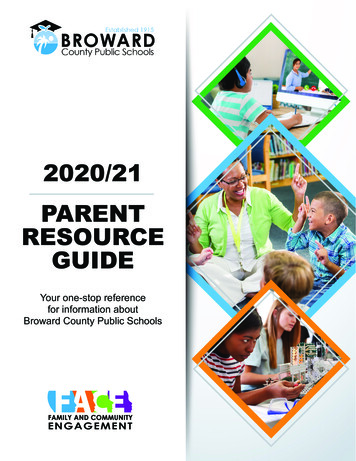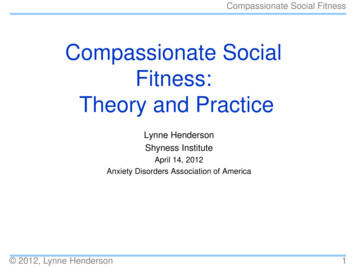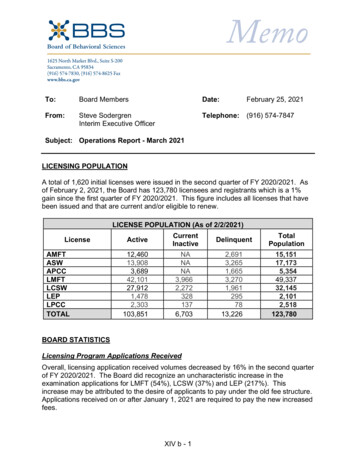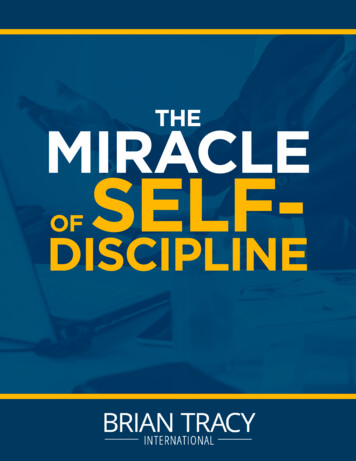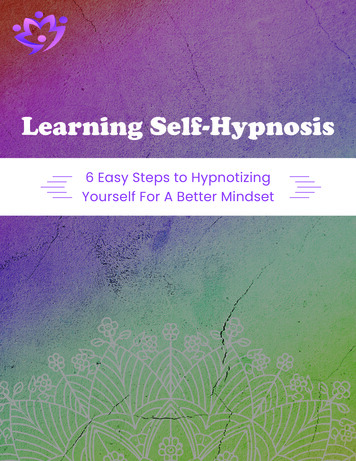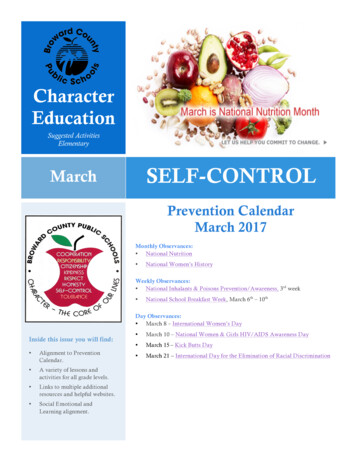
Transcription
1CharacterEducationSuggested ActivitiesElementarySELF-CONTROLMarchPrevention CalendarMarch 2017Monthly Observances: National Nutrition National Women’s HistoryWeekly Observances: National Inhalants & Poisons Prevention/Awareness, 3rd week National School Breakfast Week, March 6th – 10thDay Observances: March 8 – International Women’s DayInside this issue you will find: Alignment to PreventionCalendar. A variety of lessons andactivities for all grade levels. Links to multiple additionalresources and helpful websites. Social Emotional andLearning alignment. March 10 – National Women & Girls HIV/AIDS Awareness Day March 15 – Kick Butts Day March 21 – International Day for the Elimination of Racial Discrimination
NSDEFINITIONSIdeas on How to Use: Post character trait & definition around the schoolcampus. Teachers use definitions to help studentsunderstand the meaning of the characterdevelopment trait.Self-Control is essential for helping us to stay safe, besuccessful, and create peace. Self-control means steeringyour life in a positive direction and doing what is right.When you say “no” to one thing, think of it as saying,“yes” to something better – something that can help youreaches your goals. Self-control allows students tothink before they act, control their temper, respectothers and their belongings, sit still and be quiet andbuild healthy habits. It is the ability to make oneself dowhat you know you should do when you should do it,whether you feel like it or not.Definitions: Having discipline over one’s behavior or actions. Choosing to do what is right, even when I don’t feellike it. Power to discipline one’s own feelings, desires, etc.,especially with the intention of improving oneself. Training and control of oneself and one’s actions. Thinking about your words and actions, and thenmaking choices that are right for you and others. Controlled behavior In charge of what I do and what I sayQUOTATIONSIdeas on How to Use: Display a quote each week. Share on morningannouncements. Teachers post quotes in classrooms. Have students write about what the quote means tothem. Have primary students draw a picture to go with thequote. Encourage students to create their own ‘quote’ thatpromotes monthly trait.Grades K – 2“The time is always right to do what is right.”– Martin Luther King“With self-discipline most anything is possible.”– Theodore Roosevelt“If we don’t discipline ourselves, the world will do it forus.”– Winston Feather“The only discipline that lasts is self discipline”- Burn PhillipsGrades 3 – 5“Discipline is the bridge between goals andaccomplishments.”- Jim Rohn“Do not consider painful what is good for you.”– Euripedes“In reading the lives of great men, I found that the firstvictory they won was over themselves self-discipline withall of them came first.”- Harry S. Truman“Half of life is luck; the other half is discipline – and that’sthe important half, for without discipline you wouldn’t youfeel like it or not.”- Brian Tracy2
SELF-CONTROL/ELEM.MARCHBook ListIdeas on How to Use: In media center, designate a character trait “Featured Readings” sectionwhere books promoting the month’s theme are displayed and availablefor checkout. Have students read books, and then depict how the book exemplifiedthe character trait.ActivitiesThe Grouchy Ladybugby Eric CarleRead to the class The GrouchyLadybug by Eric Carle. Discuss whyhe wanted to fight and how to useself-control when angry feelings getin the way.The Hating Book by Ben ShecterRead aloud The Hating Book by BenSchecter or share another storystressing the importance ofcommunication. Discuss howsometimes people act on theirfeelings or gossip before they findout all of the necessary information.Discuss how doing this often createsor escalates a conflict.Gulliver’s Travel by Jonathan Swift(Grades 3 – 5) In Gulliver’s Travel,Jonathan Swift sends hisprotagonist to the land of theHouyhnhms. In this country,horses are the highest beings. Theyare intelligent, rational, and fair. Incontrast, human beings are calledYahoos. They are crude, ignorant,savage, and totally lacking selfcontrol. Read this section ofGulliver’s Travels with your class anddiscuss the points that Swift ismaking about human nature andself-control. You might choose toshow the film version of Gulliver’sTravels instead of reading the novel.Grades K – 2It’s a Spoon, Not a Shovel by Caralyn BuehnerChildren will learn proper etiquette while responding to silly questions aboutthe right and wrong things to say and do in this brief book.Piggy Monday: A Tale About Manners by Suzanne Bloom“Pig Lady,” the manners expert, is called into class when the studentsbehave so badly they are beginning to turn into pigs.Shrinking Violet By Cari BestViolet is the target of obnoxious Irwin and wants to shrink away, but learnsto overcome her fears when she is cast in a backstage part in the school play.Bully by Judith CaseleyAfter his baby sister is born, Jack begins to bully his friend Mickey. Usingdifferent tactics that his parents have suggested to help him get along withJack, Mickey finds that kindness does the trick.Hands Are Not For Hitting by Martine AgassiConstructive uses for hands are offered with the refrain that “hands are notfor hitting.” Readers will learn ways to handle strong feelings withouthitting.Grades 3 – 5Amelia Takes Command by Marissa MossAmelia stands up to the class bully when she returns to school aftersuccessfully commanding the space shuttle mission during a week at SpaceCamp.Miss Alaineus: A Vocabulary Disaster by Debra FrasierThe emotions of a fifth grader are revealed as she mistakenly spells a wordin the spelling bee and is humiliated by the laughter of her class.Understood Betsy by Dorothy FisherElizabeth Ann, overprotected and sickly, moves in with her cousins and hasto learn self-reliance and self-discipline in order to survive.Escaping the Giant Wave by Peg KehretAn earthquake and tsunami hit the Oregon coast while Kyle and his familyare on vacation there. Kyle saves his sister and the boy who has tormentedhim for years, and finally learns to stand up to him.Jake Drake, Bully Buster by Andrew ClementsWhen Jake and Link, known as “SuperBully”, are teamed for a classproject, Jake could easily have his one-uppance, but through restraintdiscovers how to make peace.Your Move by Eve BuntingAnxious to prove himself to the neighborhood hang, 10-year-old Jamesspray paints a sign, but realizes the dangers involved. Readers will get themessage about making choices and resisting peer pressure.3
2SELF-CONTROL/ELEMENTARYMARCHPrevention IdeasMonthly Observances:National NutritionSuper Kids NutritionThe Very Hungry Caterpillar by Eric CarleJamberry by Bruce DeganPumpkin Soup by Helen CooperNutrition 1: Food and the Digestive System (Grades 3 – 5)Nutrition 2: Good Food, Good Health (Grades– 5)Nutrition 3: Got Broccoli! (Grades 3 – 5)School-wideIdeas on how to use:3National Women’s HistoryWomen’s History MonthThis is My LifeWomen’s Words of Wisdom (Grades 3 – 5)Honoring an Important Woman (Grades 3 – 5)Women’s History Lesson: They Also Serve(Grades 3 – 5)Who Did That? (Grades 3 – 5)Weekly Observances:National Inhalants & PoisonsPrevention/Awareness (3rd week)Mind Over Matter Series: Inhalants (Grade 5)Inhalant Abuse Prevention KitNational School Breakfast Week (March 6th – 10th)Celebrate National School Breakfast WeekNSBW 2017 ToolkitDay Observances: Use suggested school-wideideas to create a culture ofcharacter and address yourschools need for a RTI Tier I –universal strategy. Any teacher or staff membersthat work with students canincorporate classroom ideas.1 PA Announcements 2 School Displays International Women’s Day (March 8)See National Women History for lessons4Teach the students deepbreathing techniques andhave classes practice togetheras a way to relax.Celebrate students selfcontrol through ‘MostImproved Student” Awards.Have class contest to seehow long students canpractice self-control as agroup in the halls or in thecafeteria.Kick Butts Day (March 15)Kick Butts Day ActivitiesMind Over Matter Series: Nicotine (Grade 5) International Day for the Elimination of Racial Discrimination (March 21)International Day for the Elimination of Racial DiscriminationInternational Day for the Elimination of Racial Discrimination Lesson Plans Have students draw a pictureof a time their felt out-ofcontrol. Pair the childrenand have them share theirpictures and display forothers to see.Ask students to create acollage or draw a picture of aperson at school or at homepracticing self-control.Display for others to see.Ask students to draw acartoon showing an exampleof self-control vs a lack ofself-control.
SELF-CONTROL/ELEM.MARCHSUBJECTAREALESSONPLANSIdeas on How to Use This Page: Integrate character trait lesson plans into all subject area instruction. Lesson plans arespecific to language arts, social studies, math/science, arts, health & physical education.LANG UAGE ARTSGrades K - 21. Characters Who have Self-ControlDiscuss how character in stories are reading or have recently read, show the importance of self-control.StoryCharacterHow is he/she showing selfcontrol?2. What is self-control?Have each student write a few sentences about what he/she could do to show what it means to have self-control whenworking with others. Compile students’ writings into a booklet or display on a bulletin board.Grades 3 – 51. How a character demonstrates self-control?Have student choose a character in a book they are reading and write their own story about how that characterdemonstrated self-control.2. How does self-control help relationships?Have students in groups make a list of qualities of good, healthy friendships and the characteristics of negativerelationships.SOCIAL STUDI ESGrades K - 21. Exchanging IdeasTo develop relationships between students in class, have partner’s exchange ideas with each other about self-control vslack of self-control. Have students share what they learned with the class.2. Review of Inspiring PeopleReview interesting people students have recently learned about and discuss how they show self-control with others tobuild positive relationships.Grades 3 – 51. Specific SkillsDiscuss the specific skills necessary to have self-control with others. Listening, sharing, taking turns, compromise andappreciation.2. Brief BiographiesHave students write brief biographies of important people in history who showed self-control.5
SELF-CONTROL/ELEMENTARYMARCHLesson Plans [cont’d]MATH/SCIENCEGrades K – 21. Working on Math ProblemsHave students work together in groups on various math problems. Haveeach member of the group do one part of the whole problem.2. Cooperating in ScienceHave students in small groups on Science activity. Encourage cooperationand discuss how it went.Grades 3 – 51. Scientists Need to have Self-ControlMake a list of some science occupations, what it is they do and how theirwork can benefit from self-control.OccupationDescriptionThe Benefits of SelfControl2. Math & Self-ControlInterview a professional who uses math daily in their job. Ask them to helpyou describe the self-control that it takes to train the mind to think aboutnumbers.Activities Read to the class a shortbiography on Albert Einstein,who was born on March 14,1879. Ask students to list waysAlbert Einstein had to use selfcontrol during his life. Discussthe student’s responses.Read to the class informationon the discovery of Florida onMarch 27, 1513. Ask studentsto respond in writing why itwas necessary for explorers tohave self-control. Discuss thestudents’ responses.After a discussion of selfcontrol, have students write apoem using the five senses as aguide; e.g. Self-control lookslike ., Self-control feels like ,etc.Assign students to read thebiography of a professionalathlete. Have them write abouthow this person utilized selfcontrol in his/her life anddiscuss the importance of selfdiscipline as it relates to his orher success.ARTSGrades K - 21. Visual Arts: Self-ControlHave students create a bumper sticker to remind people how important selfcontrol is when driving.2. Visual Arts: PerformingHave students act out a vignette from the book Feelings by Aliki and havestudents discuss about their feelings.Grades 3 – 51. Visual Arts: Self-ControlHave students make a self-control banner. Ask students to brainstormwords dealing with self-control. Paint the words on bulletin board paperand hang the banner in the cafeteria, media center, or another eye-catchingspot in the school.2. Visual Arts: Role PlayDivide students into groups of four. Students, 1 and 2 will role-play aconflict situation. Students 3 and 4 will serve as the “good guy” of selfcontrol and the “bad guy” of reaction by urging students 1 and 2 to behaveaccordingly. See which “guy” has more realistic influence on the outcomeof the conflict. Have students discuss what the “good guy” could have saidif the “bad Guy” had won.HEALTHGrades K - 21. Benefits of Self-ControlMake a list of jobs or responsibilities that students need self-control. Havestudents explain how they show self-control while working with others andthe benefits of having self-control.2. Ideas on How to Use:6
SELF-CONTROL/ELEM.MARCHLesson Plans [cont’d]Grades 3 – 51. Self-ControlHave students create a log to monitor all the behaviors they consider“independent behaviors” (e.g., waking up on time, being prepared for class,doing chores without being told, etc.) At the end of the week, celebrate withcertificates for “being independent.”2. Self-Control ChallengeChallenge the class to show self-control when faced with opportunities toover-indulge while eating or shopping. Have the class log behavior-showingself-control. From the log, they should write a paragraph on how s/he wasable to accomplish this task of using self-control in a selected situation.School-wide [cont’d]3Special Events & Programs4Class ActivitiesPHYSICAL EDU CATIO NGrades K - 21. Encouraging Self-Control and good SportsmanshipBefore students play a game, encourage them to build healthy relationshipsby showing good sportsmanship and self-control with their teammates andother teams. As they are playing affirm students who are showing goodsportsmanship and self-control.Grades 3 – 51. Sportsmanship and Self-ControlHave students work together to sportsmanship and respect towards others.2. Self-Control in sportsHave students make a list of specific ways team members need to show selfcontrol when playing a sport. Discuss what negative consequences occurwhen not showing self-control as a team.LEAPSLeaps Lessons on Self-Control K-3Leaps Lessons on Self-Control 4-5Classroom PresentationsHave the class produce a videousing copyright-free music andoriginal poetry regarding howstudents can solve problemswithout violence. This can beshown to other classes or atschool/community events.Peer MediationEstablish a peer mediationprogram using peers to helpresolve problems by helping thedisputing parties understand thepositive consequences of usingself-control.Make a “Solution Wall” wherestudents, in pictorial or writtenform, can express their positivesolutions regarding negativefeelings/actions, which resulted ina conflict. Steps to take in doingthis are:1) Have students make a list ofdifferent situations in whichthey found themselves “losingcontrol” of appropriatebehavior or feelings.2) Have students then writedown what they said or did inresponse to what happened toupset them.3) Have students write out a setof directions that they can sayto direct themselves to staycalm and in control of theiractions the next time the samething happens. In doing this,ask students to think about,and include, what they couldsay to that person that wouldbetter let him/her know whatcaused them to get upset.Also, ask them to think about,and include, what they coulddo to make the situationbetter.7
SELF-CONTROL/ELEMENTARYMARCHService LearningClassroom IdeasClass Discussion Topics Brainstorm with the class waysto exercise self-control whentheir pet misbehaves and upsetsthem. Write an essay on howstudents can use these sametechniques when upset with ayoung child, friend or theirparent. Discuss with the class the selfcontrol needed to conserveenergy and environmentalresources. Brainstorm howstudents can conserve energy.Consider different areas (e.g., inthe home, traveling, etc.) Afterbrainstorming, have studentswrite a paper on how theypersonally can conserve energy.Creative Expression Ask students to create a selfcontrol pamphlet with ideasand things that people could dowhen they are on the verge oflosing their temper orperforming another act thatdemonstrates poor self-control. Have students practiceexpressing their opinionsregarding something aboutwhich they feel very stronglywithout showing anger. Roleplay with others, having theclass provide feedback andsuggestions for improvement.8Ideas on How to Use this Section: Promote school-wide service learning initiative/campaigns usingprovided ideas. (Do a ‘service day’; encourage classes to do randomservice acts of kindness to other classes/staff, etc.) Engage school clubs/student council to lead service projects.School Service-Learning 3 R’s (Recycle, Reduce, and Reuse)Science and Social Studies students will study the 3 R’s (recycle, reduce, andreuse) and make posters for their room. They eventually will expand the useof their posters to the halls in the school and eventually to store fronts in thecommunity. Booklets (Kindergarten)Students develop booklets containing activities they did in their first year ofschool that required self control and felt that preschool children would liketo hear about. The kindergarten children will read the booklets theyproduce to preschools children so that the preschool children can betterunderstand what kindergarten is really like.Community Service-Learning Science and ArtThe children combine a science lesson (growing marigolds) with art(decorating pots) to produce unique gifts for senior citizens in a home. Thestudents can present the gifts individually to the residents. Paper FlowerpotsStudents learned how to make paper flowerpots, which they can give to“adopted grandparents” at area elder care communities. Then they useshredded paper to create paper pulp. They shape the pulp into starter potsand plant flowers in them. The students tell the recipients how they madethe pots and talk to them about recycling.Hands-on Activities/ProjectsElephant StampedeGrades K – 5 The class will get to stamp their feet and make lots of noise in this one,but the teacher regulates it all. The teacher puts a hand to their ear andsays “What’s that I hear?” The class responds by saying “ElephantStampede!” The teacher then says where are the elephants? I canbarely hear them!” The class responds with “Far away!” and beginquietly stamping their feet on the floor to mimic the sound of elephantsin the distance. The teacher repeats their lines, adjusting for how closethe elephants are, until the herd arrives in the classroom. Now thestudents can make elephant trumpets and stamp their feet as hard asthey can until the teacher begin to quiet them down by sating “Oh good,they’re going away!” The children respond by stamping their feet moresoftly, and continue to respond to the teacher until the elephant herdhas left the building.
Family NewsletterD ear Pa rent:Self-Control is the ability to be in control of your actions so that you canmake positive choices that benefit you and others. To be successful, ourchildren need to learn from their experiences and develop self-discipline,which will help them keep their impulses and feelings from controlling them.Self-Control is a practical skill that gives out children tangible benefits in theirlives and in their relationships with others.Personal Thoughts for Parents In what ways do I show self-control?In what areas of my life is it hard for me to be self-controlled? Why?What can I do to be more self-controlled?Modeling MomentsDISCUSS with your child the areas of your life where you show self-control.ADMIT to your child when you do not show self-control.CHALLENGE yourself and your child to be more self-controlled in areaswhere it may be hard. Developing Self-Control through ServiceAs a family, prepare and cook a meal together. Deliver the meal to alocal homeless shelter or elderly facility. If you can, help serve the meal.As a family, learn how a local group helps people in your community.Have a family yard sale and donate the money to this group.Character Education: ElementaryMarchDinner/Car DiscussionsDiversity, Prevention & InterventionLauderdale Manors Early Learning &Resource Center1400 NW 14th CourtFort Lauderdale, FL 33311(754) 321-1655Fax: (754) ung@browardschools.com Have each family member explain ways that he/she hasshown self-control that day. Have family members tell about how they have seenother family members show self-control. Have family members share about times when they didnot show self-control. Have family members explain some of the benefits ofshowing self-control.“The experience of a sense of guilt for wrong-doing is necessaryfor the development of self-control. The guilt feelings will laterserve as a warning signal which the child can produce himselfwhen an impulse to repeat the naughty act comes over him.”- Selma H. Fraiberg
victory they won was over themselves self-discipline with all of them came first.” - Harry S. Truman “Half of life is luck; the other half is discipline – and that’s the important half, for without discipline you wouldn’t you feel l
